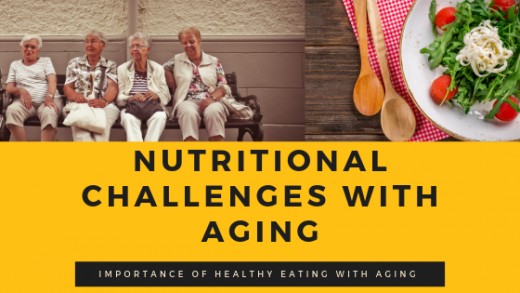How to Overcome the Nutritional Changes That Occur With Aging

Aging is an inevitable process. Eating healthy becomes more and more important as we age. The basic reason behind this is that with aging, our body undergoes many changes (could be physiological or pathological or both) which includes various types of nutritional deficiencies and poor health outcomes all of which are linked to poor quality of life.
However, by ensuring a diet that is nutrient rich and age-appropriate we can help to prevent such nutritional deficiencies and reduce the effect of other age-related changes. So, today we will discuss how your nutritional needs change with age and how you can address them.
The Relationship Between Aging and Nutritional Needs
With aging comes a variety of changes in the body. This includes some of the following:
- Weight loss
- Loss of muscle mass (sarcopenia)
- Skin thinning
- Reduced stomach acid production
Many of these changes make us susceptible to nutritional deficiencies. Some can even affect our senses and quality of life. Several studies have found that 20% of older population suffer from atrophic gastritis which results in less acid production in the stomach due to chronic inflammation ( a quick tip: anything that ends -itis refers to inflammation of that organ/tissue. So here gastritis means inflammation of the stomach, or more specifically the lining of the stomach). Low stomach acid production is associated with reduced absorption of various micronutrients such as vitamin B12, calcium, iron and magnesium.
Aging is also associated with a decreased caloric need. This may present as a challenge because older people may need more, if not just as much, nutrients, while at the same time eating fewer calories. However, we now have nutritional supplements which can help us to meet our nutrient needs. Eating whole foods can also help us to meet our nutrient demand.
Our senses such as hunger and thirst also get reduced with aging. This may result in dehydration and unintentional weight loss in older people.
More Nutrients but Fewer Calories
The daily caloric need of a person depends on the height, weight, muscle mass, physical activity level (PAL) and a few other factors. Older people generally need fewer calories to maintain their weight because they tend to have less physical activity (such as exercise) and carry less muscle mass. As such, if we continue to eat the same number of calories as we age, we will start to gain weight, especially in terms of fat. This weight gain is most prominent in the belly area.
This is particularly important for postmenopausal women because their estrogen level drops after menopause which is associated with increased storage of belly fat.
The challenge, as mentioned before is that as we age, we need to have either the same or a higher level of nutrient intake while consuming fewer calories. Therefore, it is crucial to ensure older people eat a variety of whole foods such as fruits, vegetables, fish and lean meat. This can ensure that we receive the proper nutrients without becoming fat. Nutrients that extremely important as we age are protein, fibers, vitamin D, calcium, and vitamin B12.
Protein
As mentioned before, aging is related to sarcopenia – loss of muscle mass. The average adults lose about 3-8% of their muscle mass with each decade after the age of 30. This may cause weakness, fractures and poor quality of life. Eating more protein could help to fight sarcopenia and maintain a healthy muscle mass.
A prospective cohort study involving 2066 older people over three years found that those who consumed the most protein daily had 40% less muscle mass loss compared to those who ate the least. A review of 20 studies found that eating more protein or protein supplements may slow the muscle loss rate and increase the muscle mass.
Other studies suggest that the combination of exercise and a protein-rich diet is the best way to prevent sarcopenia.
Fibers
Constipation is a common problem among the older population, especially after the age of 65. It is about two to three times more common in women. The reasons could be due to less physical activity and medication side effects.
This is where fibers come in. Eating fiber can help to reduce and relieve constipation as dietary fibers stimulate the bowel movement. A high fiber diet also helps to prevent diverticular diseases which result in small pockets in the colon resulting in infection and inflammation. It is an extremely common disease, affecting around 50% of people over 50 in western countries. However, in countries such as Japan and Africa, where the diet is rich in fibers, diverticular disease is almost absent. As such it is often considered as a disease of the Western diet. Japanese diet is rich in pants such as ashitaba which may slow the aging process!
Calcium and Vitamin D
With aging, the bones may fracture more easily. One of the reasons could be due to the fact that with aging, the absorption of calcium is reduced. Reduced calcium absorption may also be due to a deficiency of vitamin D which may due to less production with aging. This happens because vitamin D is produced from the cholesterol in our skin when it is exposed to sunlight. However, with the thinning of the skin, our body naturally produces less vitamin D.
These two micronutrients are crucial for the maintenance of healthy bones and as such older people need to consume more calcium and vitamin D either through food or supplements or both. Foods that are high in calcium include dairy products and dark green leafy vegetables. Vitamin D is abundant in fish such as salmon and herring. Cod liver oil is also a good supplement of vitamin D.
Vitamin B12
Vitamin B12 is a water-soluble vitamin. It is also known as cobalamin. Vitamin B12 is crucial for red blood cell production and maturation as well as maintenance of healthy brain function.
However, with aging, especially over the age of 50, around 10-30% of people absorb less vitamin B12 from their diet. This may be due to atrophic gastritis leading to less stomach acid production which is necessary for vitamin B12 absorption. This may lead to vitamin B12 deficiency.
Deficiency of vitamin B12 may also happen in older people who follow a strictly vegan or vegetarian diet which is less in animal foods such as eggs, fish, meat and dairy which are excellent sources of vitamin B12.
Thus, it is important that older people take vitamin B12 supplements or foods that are fortified with vitamin B12. Fortified foods contain crystalline vitamin B12 which is not bound to food proteins. This allows those people who produce less stomach acid to still absorb the vitamin.
Other Nutrients That Are Important with Aging
- Potassium: associated with a lower risk of blood pressure, kidney stones, osteoporosis and heart diseases
- Omega-3 fatty acids: can reduce the risk of high blood pressure and triglycerides
- Magnesium: necessary for proper homeostasis of the body
- Iron: can prevent iron-deficiency anemia
Increased Dehydration
We know that about 60% of our body is composed of water. Water is essential for proper homeostasis.
Our body detects thirst through receptors present in the brain and all over the body. With aging, these receptors become less sensitive and make it harder to detect thirst. This may lead to dehydration which can not only cause fatigue but also affect the ability of the body to absorb and utilize medications. Therefore it is crucial to consciously drink enough water daily. Carry a water bottle with you wherever you go. You may even use mobile apps to remind you to drink water at regular intervals.
Decreased Appetite
Older people may suffer from decreased appetite which may result in unintended weight loss and nutritional deficiencies. Loss of appetite is also associated with poor health outcomes and increased risk of death.
Decreased appetite may be as a result of hormonal changes, loss of taste and smell and many other factors.
Studies found that older people who have decreased appetite may have lower levels of hunger hormones (ghrelin) and higher levels of fullness hormones (cholecystokinin and leptin). This means they get hungry less frequently and feel fuller more quickly.
One way to combat this is to make the meal portions smaller and eating every few hours.
Conclusion
Aging is associated with a variety of changes and nutritional deficiencies as highlighted above. However, we can take some conscious efforts to ensure that we continue to have a good quality of life throughout all ages!
This content is accurate and true to the best of the author’s knowledge and does not substitute for diagnosis, prognosis, treatment, prescription, and/or dietary advice from a licensed health professional. Drugs, supplements, and natural remedies may have dangerous side effects. If pregnant or nursing, consult with a qualified provider on an individual basis. Seek immediate help if you are experiencing a medical emergency.
© 2019 Ishti










